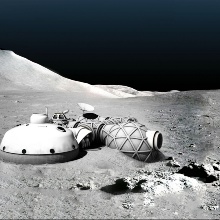Life in space is hard. If you wish to colonize it, for example by setting up stations on the Moon or on Mars, you need technologies that enable extremely efficient use of the scarce resources. The aim of the ERIS research project is to make use of these space technologies in the context of climate protection and the long-term safeguarding of life on Earth. The University of Stuttgart is supporting ERIS with the development of sustainable life support and supply systems to ensure the efficient production of oxygen, water, and food for the colonization of space.
Whether raw materials, energy or food: what people on space stations far from Earth need to survive must be produced autonomously on site and what is available is very limited. It is therefore paramount that these resources are used as efficiently as possible - and this is a challenge increasingly being faced on Earth. Better efficiency is necessary in order to cope with climate change, to help meet sustainability goals and to secure our livelihoods for future generations.
Why not learn from space technologies? This is precisely the goal of the "European Research Institute for Space Resources" (ERIS) project. Under the leadership of the TU Bergakademie Freiberg, the project partners aim to explore the transfer potential of innovative technologies for the utilization of space resources in order to develop approaches to solutions for societal challenges on Earth. A large-scale research center in Lusatia is being planned to serve this purpose and will open in 2023. This center is intended to bring together experts from the fields of space technologies, as well as raw materials, energy, materials and production research that will enable research into relevant technologies, the construction and production of necessary infrastructure and supply systems.
ERIS - European Research Institute for Space resources
The overall mission of ERIS is to develop the scientific and technological basis for the construction and operation of research stations on other celestial bodies utilising primarily resources available on site and implementing closed supply cycles. To fulfil this task, innovative technologies will be developed that enable this highly efficient use of resources as well as resilient and environmentally friendly production and supply on Earth.
The IRS is involved in the fields of life support and supply systems.
For the ERIS project, the Institute of Space Systems (IRS) at the University of Stuttgart will coordinate the development of innovative research approaches for life support systems, bioproduction and energy. To this end, the IRS brings many years of research experience in the field of life support systems for manned spaceflight based on biological components. "Specifically, we are researching the efficient and sustainable production of oxygen, water and food for people who will one day live in an extraterrestrial environment," explains Stuttgart-based project coordinator Dr. Gisela Detrell. In addition, bioproduction can also be used to provide potential biomaterials.
Until now, the IRS has focused primarily on microalgae, from cultivation to the post-processing required to produce food from the cultivated microalgae biomass. The infrastructure to test the effects of different atmospheric compositions as well as lighting concepts is also available at IRS. In recent years, the researchers have also focused their attention on biomass sensors and automation processes. Previous findings are to be integrated and further developed as part of the ERIS project, to enable networked supply systems and an overall system design to suit a range of different scenarios.
The ERIS project aims to establish a unique infrastructure in Lusatia, a coal region undergoing structural change, which will enable a nationwide focus on essential research priorities for the utilization of space resources. This network comprising both academia and industry is intended to create new synergic capabilities, enabling participation at an international research level in the development of innovative technologies that will be essential not only for the future of space travel, but especially for the sustainable use of resources on Earth.
Durch ERIS soll in der Lausitz, einer Kohleregion im Strukturwandel, eine einzigartige Infrastruktur etabliert werden, welche eine bundesweite Fokussierung essenzieller Forschungsschwerpunkte für die Nutzung von Weltraumressourcen ermöglicht. Das Netzwerk aus Academia und Industrie soll neue Synergiepotentiale schaffen, um auf internationaler Forschungsebene bei der Entwicklung innovativer Technologien mitwirken zu können, die nicht nur für die Zukunft der Raumfahrt, sondern insbesondere für den nachhaltigen Umgang mit Ressourcen auf der Erde essenziell sein werden.
Expert Contact:
Dr. Gisela Detrell, Universität Stuttgart, Institut für Raumfahrtsysteme, Tel. +49 (0) 711 685 69611, E-Mail


